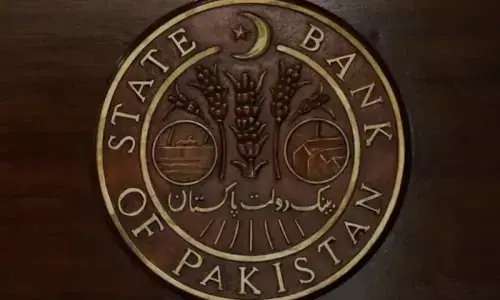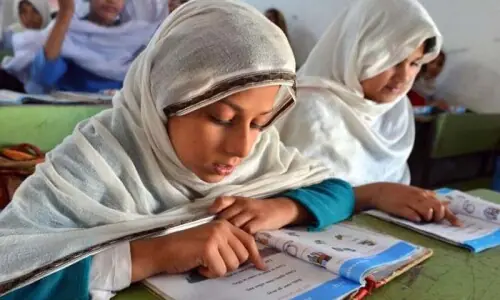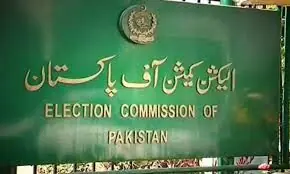IF you need any proof that Mr Imran Khan is not ready to wield power, much less execute complex ‘plans’ for the economic revival of this country, look no further than the conundrum in which he finds himself in the ongoing talks on selecting an interim prime minister.
First Mr Khan complained on various TV talk shows that the two big parties — the PML-N and PPP — were not reaching out to him when deciding on the interim prime minister.
Then we hear from the PML-N that Mr Khan had provided them with names of his preferred candidates. Then Mr Khan denied having any contact with the PML-N. Then the latter released the two names in question, and also revealed the names of the people through whom Mr Khan’s wishes had been communicated.
So has Mr Khan been talking on the sly with the very party he loves to vilify? And if so, why is it so hard for him to admit it? And why would he complain that the big parties are not consulting him when deciding this important matter?
The fact is that Mr Khan has painted himself into a corner and cannot figure out how to get out of it. He has presented himself as a candidate above politics, but at the same time has to navigate the facts of life in a parliamentary democracy, which are always negotiated. Now that the negotiations have begun, and will only grow in scope and complexity as the election cycle unfolds, he is left fumbling for a response.
There is plenty that is going to be negotiated from here onwards. A date for when the polls will be held is next on the agenda, after the composition of the interim government has been agreed upon, and at least one party — the PML-N — has already announced its preference for the date to be “no later than January”. Does Mr Khan intend to participate in these parleys, or does he intend to sit them out too?
Of course, the real negotiations will begin after election day. A lot will depend on the new parliamentary arithmetic that emerges from the election, but notice once again how the PTI is the only party that has revealed what its post-election strategy is going to be.
In multiple forums, Mr Khan has clearly stated that his party will either form the next government on their own or will sit in opposition. On no account, he says, will his party consider becoming a coalition partner with the PML-N or the PPP, although in a June rally in Mirpurkhas he opened the door to forming a government with the Jamaat-i-Islami.
This is vintage Khan: no compromise, no middle ground, no negotiation. This is either supreme self-confidence or supreme amateurishness. It makes no sense in a parliamentary democracy to tie your own hands by staking out such rigid positions so early in the game.
One is also puzzled by his insistence that the mainstream parties like the PML-N- and PPP are responsible for the mess the country is in, but the JI is not. If the mainstream parties are morally repugnant, how come there’s no feeling of shame in walking to the residence of Sheikh Rashid to form an electoral alliance?
By insisting on forming his own government, with only minor parties as allies, Mr Khan is trying to create a moment whose last parallel was seen in the 1997 elections, when Mr Sharif’s PML had swept into power with a massive mandate — a two-thirds majority in parliament. But it’s important to note an important difference between that election and this one. At that time, Mr Sharif’s party was the only one contesting in Punjab besides the PPP, whereas this time there are four major parties in the biggest province , an unprecedented state of affairs in Pakistan’s political history.
Since Punjab’s share of seats in the National Assembly is critical to building a viable majority, and since it is unlikely that any one player is going to sweep the province the way Mr Sharif did in 1997, it follows that no single party will emerge with the numbers to ‘go it alone’ in the aftermath of the election.
It will take deft negotiation to form the next government, and skilful politics to hold it together, but Mr Khan has already opted out of the process saying time and time again that he will not enter a coalition with the mainstream parties.
Clearly it is Mr Khan’s right to choose his style of politics and his coalition partners. But in a parliamentary democracy it is always wise to keep channels of communication open with all players and not to wall yourself off behind red lines.
It’s possible to see a contradiction behind his refusal to talk to the mainstream parties on the grounds that they are “responsible for the mess the country is in” whilst he signals his willingness to engage with parties that have been active players in the growing encroachment of religious injunctions in the spheres of law, policy and politics.
But there is always the question of whether ‘corruption’ has created more of a mess than the fanning of religious fears and animosities in this country.
Mr Khan’s predicament is set to become more and more difficult as the election cycle wears on. His fondness for taking hard and rigid positions, then looking for ways to climb down from them will not serve him well.
And it’ll be the same if the time should come for him to implement his ‘plan’ for the country’s economic revival, where politics and negotiation also play a crucial part in carrying a large agenda forward.
This is amateur politics, and the sooner Mr Khan is able to shed this style, the better off his party is going to be in the realities of Pakistan’s parliamentary politics.
The writer is a Karachi-based journalist covering business and economic policy.






























